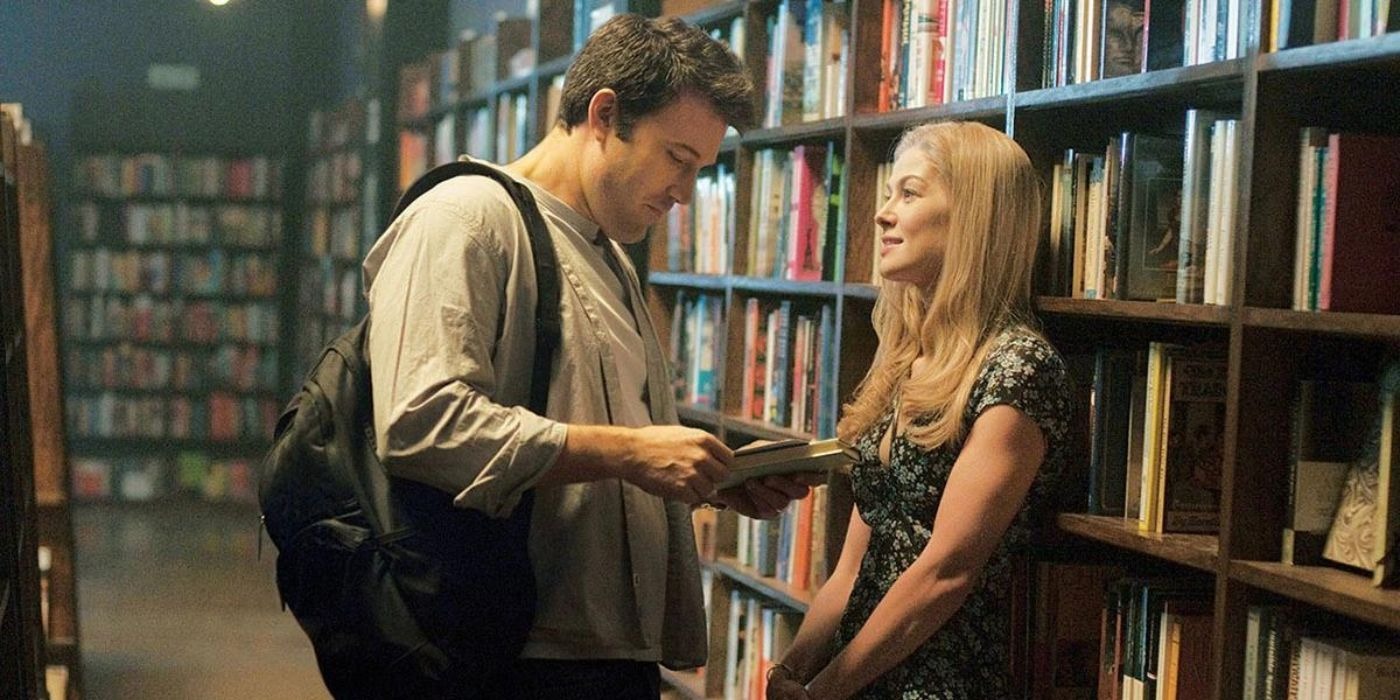The story of Gone Girl centers around the puzzling disappearance of Amy Dunne (Rosamund Pike), culminating in a climactic twist that reveals the toxic manipulation underlying her marriage to Nick (Ben Affleck).
Initially, the plot seems to adhere to the archetype of a domestic thriller, with Nick cast as the prime suspect in the suspected murder of his wife.
However, the film takes a surprising turn, revealing that Amy is alive and orchestrating an elaborate scheme to frame Nick. This shift showcases an adept storytelling approach that avoids conventional clichés and maintains viewer engagement.

Directed with precision by David Fincher and featuring a sharp script by Gillian Flynn, adapted from her own novel, Gone Girl stands out as a compelling portrayal of a fraught and unhealthy marriage.
The novel’s narrative structure is mirrored in the film through Amy’s journal entries, preserving the story’s dark tone. The conclusion of Gone Girl provides answers to pivotal questions about the couple’s fate and Amy’s motivations for her disappearance.
While many twist endings may fall flat, the revelation of Amy’s meticulous planning leaves a lasting impression, allowing for a deeper exploration of her complex character in every scene.
Unraveling the Plot Twist
A hallmark of any good thriller is an unexpected conclusion, and Gone Girl perfectly exemplifies this with its masterful twist. As the plot reveals, Amy’s seemingly impeccable scheme reveals vulnerabilities she hadn’t anticipated, particularly in her interactions with the menacing Desi Collings (Neil Patrick Harris), her former lover who seeks to control her. This is the only moment in the film where Amy displays genuine fear.
In a dramatic turn of events, she resolves to return to Nick by eliminating Desi, framing him as her kidnapper. This pivotal action is key to understanding Amy’s character development, highlighting her willingness to go to any lengths to achieve her desires. By the end of Gone Girl’s timeline, Amy’s return to Nick appears to offer a shocking yet publicly palatable resolution.
Although Nick believes he has gained the upper hand, Amy cleverly sways him to accept her back by announcing her pregnancy, appealing to the dormant sensitivity within him. Her statement, “Nick got lazy.
He became someone I did not agree to marry. He actually expected me to love him unconditionally,” unravels her rationale for vanishing: seeking retribution for Nick’s infidelity and the decline of his affectionate demeanor since their courtship.
Amy’s Manipulation Through Pregnancy
Nick’s portrayal is anything but sympathetic; his infidelity and negative behavior reveal that both partners contribute to their marriage’s downfall. Amy’s unexpected pregnancy at the story’s conclusion exposes her long-standing strategy: compelling Nick to remain in their union for the sake of their child.
This element harks back to the film’s beginning, where Amy pretends to be expecting to elicit sympathy and tarnish Nick’s reputation further. She hypothesizes that a child cannot be disregarded, demonstrating her intelligence and insight into her husband’s psyche. Without her pregnancy, it is likely he would abandon their relationship.
Gone Girl is unforgettable as a psychological thriller due to its exploration of Amy’s intense mental state and her inherent unreliability. She ensnares Nick in a life she perceives as confining, mirroring the way she feels trapped in their mundane Missouri existence compared to their vibrant life in New York City. Channeling her discontent with her uninspired domesticity, Amy forces Nick to acknowledge her once more.
Margo’s Struggles with Amy’s Return
While Amy grapples with Nick’s apparent loss of admiration, he is equally shocked by the stark reality of his new life in Missouri, where he operates a bar and teaches journalism.
His close bond with his sister, Margo Dunne (Carrie Coon), serves dual purposes. Margo, affectionately nicknamed “Go,” expresses disapproval of Nick and Amy’s reunion and impending parenthood. She stands out as the only character who candidly confronts Nick about his infidelity and questions Amy’s motives throughout the narrative.
Go is also the sole character, apart from Nick, who recognizes Amy’s deceitful nature. Ignoring his sister’s perspective, Nick demonstrates his capacity for coldness, mirroring his wife’s behavior.
Go perceives the uncomfortable truth: their toxic dynamic fuels their mutual misery, yet they lack the resolve to end their marriage. They seem to derive a twisted satisfaction from each other’s pain.
The shocking finale of Gone Girl leaves viewers in stunned silence, as it highlights Nick’s lack of innocence and hints at potential future revenge against Amy. Go’s presence suggests she will support her brother, but her watchful eye remains fixed on Amy.
Comparing the Film’s Ending to the Novel
The conclusion of Gone Girl aligns with the book’s resolution, showcasing the couple’s reunion and their façade of a harmonious marriage. Minor differences exist in the film adaptation, particularly with Nick’s comment to Amy, “I feel sorry for you because every morning you have to wake up and be you.”
This ending effectively illustrates that while Amy has persuaded Nick to stay in their marriage and raise their child, he retains a measure of power.
The underlying theme remains intact in both versions, with the final scene depicting the couple’s announcement of their baby serving as a reminder of their attempts to maintain appearances. As long as they can project an image of happiness, they can convince others that all is well.
Decoding the True Meaning Behind Gone Girl’s Conclusion
Not only does Gone Girl feature one of cinema’s most memorable plot twists, but its ending also delves into the troubling decisions individuals make and the ease with which they can rationalize their actions.
Although Amy and Nick may feel estranged, they finally reflect the same ruthless, calculating, and self-serving nature. They are willing to do whatever it takes to survive, disregarding the collateral damage along the way.
While Nick can dismiss his sister’s concerns regarding his life decisions, Amy craves validation from outsiders to progress. The film’s conclusion implies that Nick’s safety is compromised as long as he remains married to Amy. Although she emerges victorious in this round, the potential for her to manipulate him again looms large.
Should Nick stray again or make decisions Amy disapproves of, she is poised to devise a new scheme. Conversely, Nick might betray Amy once more, and she may underestimate his resolve. The unsettling tone of the final scene reinforces the notion that neither partner is trustworthy or morally upright.
David Fincher’s Vision for the Gone Girl Ending
The conclusion of Gone Girl was not always set in stone. David Fincher revealed that author Gillian Flynn discarded the original ending of her book and “started from scratch.”
This caused concern among fans of the novel, but Flynn later described the reaction as “greatly exaggerated.” Fincher clarified that the film’s ending retained the same objectives while introducing a new “bone structure,” which Flynn implemented when adapting the story for the screen.

As both book readers and moviegoers can attest, the endings align, albeit with minor adjustments in the dialogue between Nick and Amy. In an interview, Fincher expressed that he perceives the film as transitioning from a mystery to an absurdist thriller and finally a satire.
Despite these shifts, Fincher openly aligns himself with “Team Amy,” sharing moments where he finds himself rooting for her and relishing her elaborate schemes for revenge. Regarding the ending, where Amy and Nick must continue their lives together, Fincher interprets it as a dark comedy.
Perspectives on the Gone Girl Ending
Since its release, the ending of Gone Girl has captivated audiences, with numerous individuals involved in the film commenting on its development and underlying themes.
Author and screenwriter Gillian Flynn expressed her surprise at the divisive reactions the film evoked, especially among those desiring retribution for Amy. She emphasized that the ending resonated with her reasoning:
“Amy’s not going to end up in jail. She’s Amazing Amy! You’re never going to find the aha! clue because she thinks she’s already thought of everything and that’s who she is. People think they would find that satisfying if she were caught and punished.
You know, when I’m at a reading or something, people come up to me and are very honest about saying, ‘I hated the ending!’ I always say, ‘Well, what did you want to have happen?’ And it’s like, ‘I wanted justice!’ I promise you, I just don’t think you’d find it satisfying for Amy to end up in a prison cell just sitting in a little box.”
A critical element of Gone Girl’s ending is the pivotal confrontation between Nick and Amy upon her return. Behind closed doors, these characters understand the truths behind the myriad mysteries and secrets.
However, this scene underwent revisions as the actors and David Fincher sought to convey Amy’s enduring dominance, despite Nick’s awareness of the deception that fooled the outside world. Rosamund Pike shared insights into the addition of a particularly crucial exchange between the characters, emphasizing the power dynamics that remain intact in their relationship.



